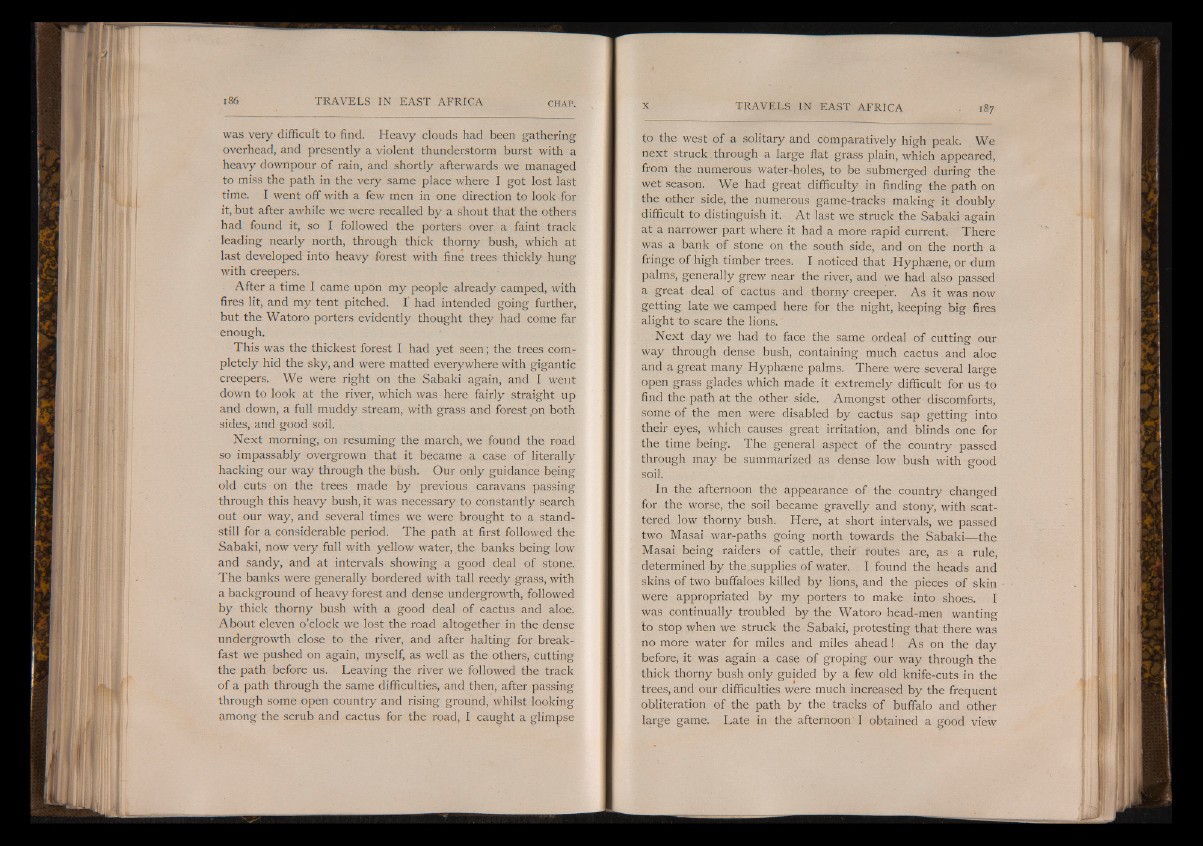
was very difficult to find. Heavy clouds had been gathering
overhead, and presently a violent thunderstorm burst with a
heavy downpour of rain, and shortly afterwards we managed
to miss the path in the very same place where I got lost last
time. I went off with a few men in one direction to look.for
it, but after awhile we were recalled by a shout that the others
had found it, so I followed the porters over a faint track
leading nearly north, through thick thorny bush, which at
last developed into heavy forest with fine trees thickly hung
with creepers.
After a time I came upon my people already camped, with
fires lit, and my tent pitched. I' had intended going further,
but the Watoro porters evidently thought they had come far
enough.
This was the thickest forest I had yet seen; the trees completely
hid the sky, and were matted everywhere with gigantic
creepers. We were right on the Sabaki again, and I went
down to look at the river, which was here fairly straight up
and down, a full muddy stream, with grass and forest ,on both
sides, and good soil.
Next morning, on resuming the march, we found the road
so impassably overgrown that it became a case of literally
hacking our way through the bush. Our only guidance being
old cuts on the trees made by previous caravans passing
through this heavy bush, it was necessary to constantly search
out our way, and several times we were brought to a standstill
for a considerable period. The path at first followed the
Sabaki, now very full with yellow water, .the banks being low
and sandy, and at intervals showing a good deal of stone.
The banks were generally bordered with tall reedy grass, with
a background of heavy forest and dense undergrowth, followed
by thick thorny bush with a good deal of cactus and aloe.
About eleven o’clock we lost the road altogether in the dense
undergrowth close to the river, and after halting for breakfast
we pushed on again, myself, as well as the others, cutting
the path before us. Leaving the river we followed the track
of a path through the same difficulties, and then, after passing
through some open country and rising ground, whilst looking
among the scrub and cactus for the road, I caught a glimpse
to the west of a solitary and comparatively high peak. We
next struck Through a large flat grass plain, which appeared,
from the numerous water-holes, to be submerged during the
wet season. We had great difficulty in finding the path on
the other side, the numerous game-tracks making it doubly
difficult to distinguish it. At last we struck the Sabaki again
at a narrower part where it had a more rapid current. There
was a bank of stone on the south side, and on the north a
fringe of high timber trees. I noticed that Hyphaene, or dum
palms, generally grew near the river, and we had also passed
a great deal of cactus and thorny creeper. As it was now
getting late we camped here for the night, keeping big fires
alight to scare the lions.
Next day we had to face the same ordeal of cutting our
way through dense bush, containing much cactus and aloe
and a great many Hyphaene palms. There were several large
open grass glades which made it extremely difficult for us -to
find the path at the other side. Amongst other discomforts,
some of the men were disabled by cactus sap getting into
their eyes, which causes great irritation, and blinds one for
the time being, The general aspect of the country passed
through may be summarized as dense low bush with good
soil.
In the afternoon the appearance of the country changed
for the worse, the soil became gravelly and stony, with scattered
low thorny bush. Here, at short intervals, we passed
two Masai war-paths going north towards the Sabaki— the
Masai being raiders of cattle, their routes are, as a rule,
determined by the.supplies of water. I found the heads and
skins of two buffaloes killed by lions, and the pieces of skin
were appropriated by my porters to make into shoes. I
was continually troubled by the Watoro head-men wanting
to stop when we struck the Sabaki, protesting that there was
no more water for miles and miles ahead! As on the day
before, it was again a case of groping our way through the
thick thorny bush only guided by a few old knife-cuts in the
trees, and our difficulties were much increased by the frequent
obliteration of the path by the tracks of buffalo and other
large game. Late in the afternoon I obtained a good view